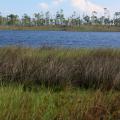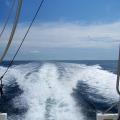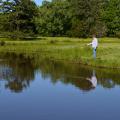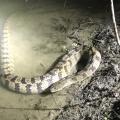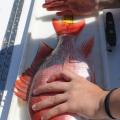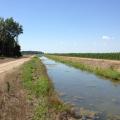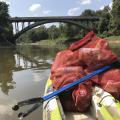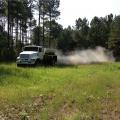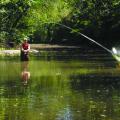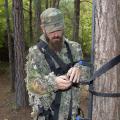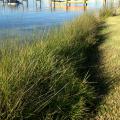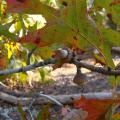Extension Outdoors from 2018
BILOXI, Miss. -- Coastal areas are dynamic in nature, which means they are constantly changing.
A fitting example of the dynamics of coastlines can be found by looking at historical, but relatively recent, aerial photos of Pelican Island off Dauphin Island, Alabama.
BILOXI, Miss. -- In everyday life, “don’t make waves” means don’t cause trouble. On the water in no-wake zones, it means basically the same thing.
Wakes are waves created as vessels travel through the water. A no-wake zone is an area where vessels are expected to travel slowly to minimize wakes.
Two of the biggest current threats to wildlife in our state are wild hogs and chronic wasting disease.
The current wild hog problem and confirmation of a CWD-positive deer this year in Issaquena County are examples of how the selfish actions of a very small segment of the hunting population can set off a negative chain of reactions that reach beyond the initial impact to wildlife species.
STARKVILLE, Miss. -- People often ask what they can plant to improve wildlife numbers on their property. Before seeking advice on what to plant, the first question should be, "Is food a limiting factor?"
Most often, Mother Nature has provided all the food wildlife need, assuming animals are provided the proper habitat. Still, there is an ecological principle at work called Liebig’s Law of the Minimum.
BILOXI, Miss. -- Marine debris, largely composed of discarded plastic products, is one of the most alarming issues facing the world’s seas today.
Plastics have the advantages of being cheap, lightweight, durable and easy to make. Unfortunately, single-use plastics often serve their intended purposes in a matter of seconds before they enter the endless stream of waste humans generate.
STARKVILLE, Miss. -- Oxygen-related fish kills can completely wipe out otherwise healthy ponds, but there is a strategy pond owners can use to control this problem.
Anoxia -- the lack of oxygen -- can form in deeper water layers of a pond during warmer months. Deeper water is heavier and denser, which prevents it from mixing with warm surface water where air and oxygen-producing microorganisms are found. As deeper water becomes isolated, its oxygen levels are depleted, reducing fish habitat and increasing the risk of fish kills.
STARKVILLE, Miss. -- It's that time of year when many parts of the state really need a good rain. Afternoon pop-up storms often bring torrential downpours that drop a couple of inches of rain in less than an hour, instead of the perfect, slow showers we need.
Most Mississippians look for activities that include shade or air conditioning to escape the heat during the dog days of summer. For those who enjoy wildlife watching, the summer heat can force us to alter our plans to the bookends of the day.
This fall, hunters will grab their bows, muzzleloaders and rifles to hunt North America’s most pursued big game animal -- the white-tailed deer.
Scientists have embarked on a colossal research project to estimate the abundance of red snapper, the most sought-after offshore fish in the U.S. controlled waters in the Gulf of Mexico.
Ever wonder what wildlife species are in your backyard during the day while you are at work or school and at night while you are sleeping? Well, now you can find out with the help of a trail camera.
STARKVILLE, Miss. -- Summer brings many activities: swimming in pools, recreation in Mississippi’s waterways, washing vehicles after traveling down dirt roads, and irrigating millions of acres of gardens and fields. These and many other activities rely on abundant water.
Putting a dollar value on clean water is difficult. Everyone uses it in their daily lives for drinking and domestic needs, but we also use water through the products we consume. This hidden flow of water is less obvious, so it’s often given less attention when we talk about water conservation.
Acres of pine forests cover Mississippi and the Southeast, but good forest management is not necessarily good wildlife management.
Rivers have been the lifeblood of communities since ancient civilizations began. Healthy river systems are just as critical to modern communities as they were to settlers who navigated the rolling waters to explore America.
Planting food plots for deer and other wildlife is common practice in Mississippi, and for good reason: Food plots provide much-needed nutrition for deer and viewing opportunities for hunters.
Everyone wants to get more than they paid for, and no one is ever excited about paying taxes. With that in mind, hunters and other outdoor enthusiasts can make a small investment with many happy returns.
Safety is a key aspect of having a successful and enjoyable hunt this season and for many more to come.
Salt marshes are coastal wetlands common throughout the globe and visible just about any time you drive over a bridge along the coast.
If you own one of the 160,000 ponds in Mississippi, chances are you have invested tremendous amounts of cash and time in this resource. Building a pond can cost tens of thousands of dollars, and fish stocking, liming, fertilization and weed control are not cheap either.

